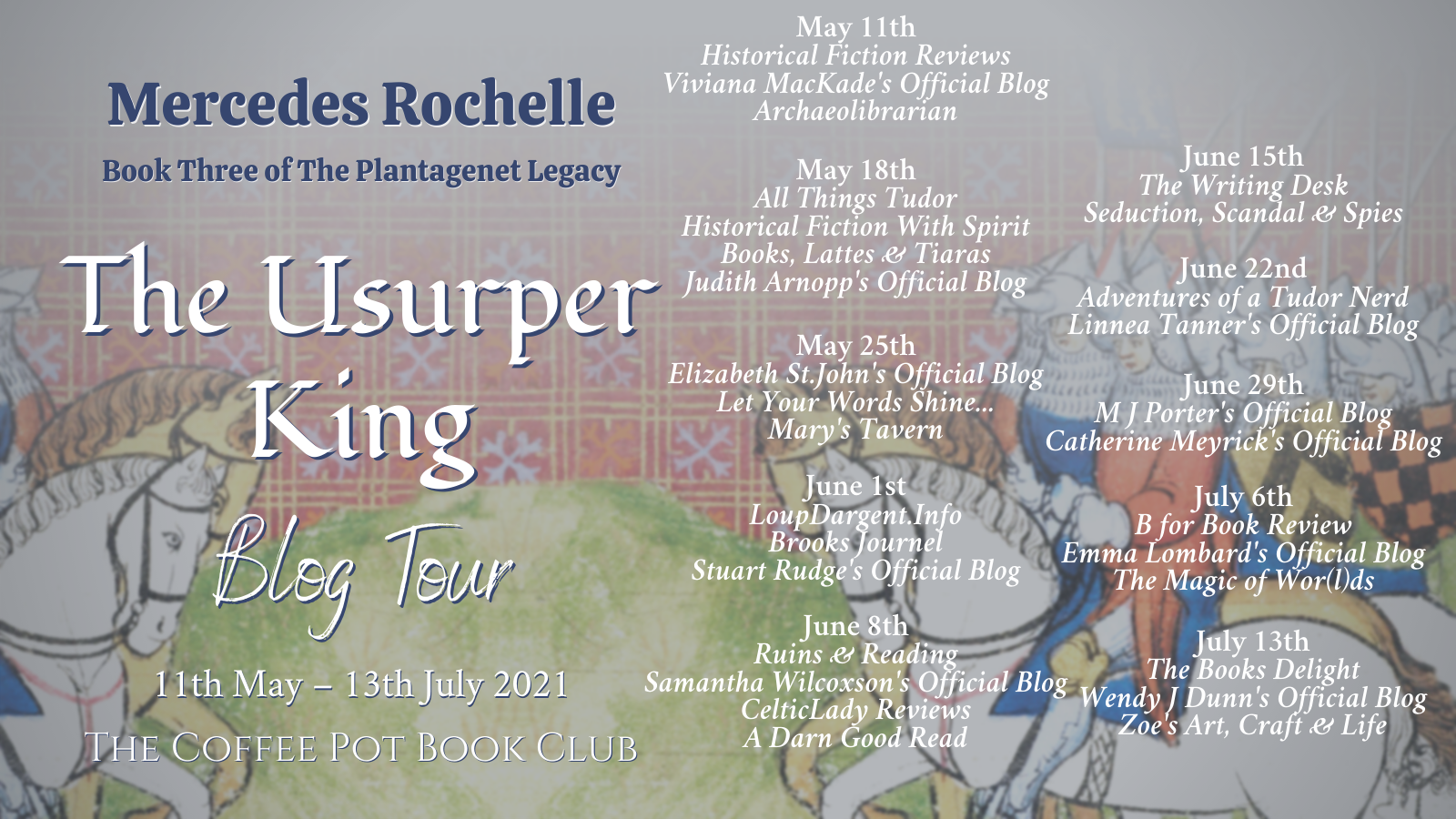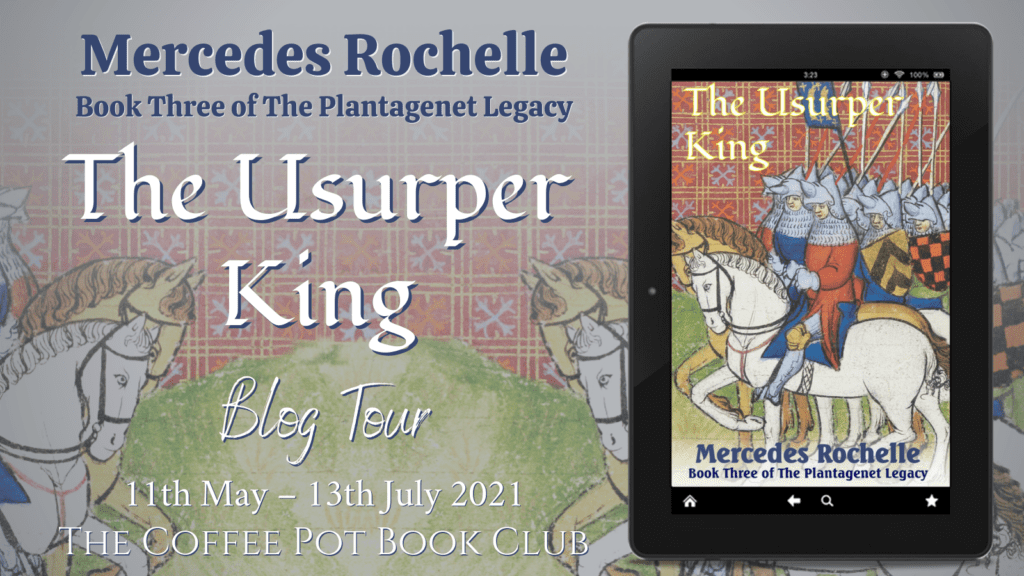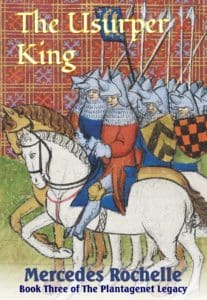
21 Jun MERCEDES ROCHELLE THE USURPER KING COFFEE POT BOOK CLUB BLOG TOUR #HistoricalFiction #Plantagenet #HenryIV #BlogTour #CoffeePotBookClub @authorRochelle @maryanneyarde
FEATURED AUTHOR: MERCEDES ROCHELLE
It is my pleasure to feature Mercedes Rochelle as part of The Coffee Pot Book Club Blog Tour being held from May 11th – June 25th, 2021. Mercedes Rochelle is the author of the historical fiction novel, The Usurper King (The Plantagenet Legacy Book 3) which was recently released by Sergeant Press on April 5th, 2021 (308 pages).
Below are highlights of The Usuprper King, Mercedes Rochelle’s author bio, and my interview with her.

HIGHLIGHTS: THE USURPER KING

The Usurper King
(The Plantagenet Legacy, Book 3)
By Mercedes Rochelle
From Outlaw to Usurper, Henry Bolingbroke fought one rebellion after another.
First, he led his own uprising. Gathering support the day he returned from exile, Henry marched across the country and vanquished the forsaken Richard II. Little did he realize that his problems were only just beginning. How does a usurper prove his legitimacy? What to do with the deposed king? Only three months after he took the crown, Henry IV had to face a rebellion led by Richard’s disgruntled favorites. Worse yet, he was harassed by rumors of Richard’s return to claim the throne. His own supporters were turning against him. How to control the overweening Percies, who were already demanding more than he could give? What to do with the rebellious Welsh? After only three years, the horrific Battle of Shrewsbury nearly cost him the throne—and his life. It didn’t take long for Henry to discover that that having the kingship was much less rewarding than striving for it.
Buy Links:
AUTHOR BIO: MERCEDES ROCHELLE

Mercedes Rochelle is an ardent lover of medieval history and has channeled this interest into fiction writing. Her first four books cover eleventh-century Britain and events surrounding the Norman Conquest of England. The next series is called The Plantagenet Legacy about the struggles and abdication of Richard II, leading to the troubled reigns of the Lancastrian Kings. She also writes a blog: HistoricalBritainBlog.com to explore the history behind the story. Born in St. Louis, MO, she received her BA in Literature at the Univ. of Missouri St.Louis in 1979 then moved to New York in 1982 while in her mid-20s to “see the world”. The search hasn’t ended! Today she lives in Sergeantsville, NJ with her husband in a log home they had built themselves.
Social Media Links:
Website ♠ Blog ♠ Facebook ♠ Twitter ♠ Book Bub ♠ Amazon Author Page ♠ Goodreads
AUTHOR INTERVIEW: MERCEDES ROCHELLE
I’m delighted, Mercedes, that you’ve agreed to an interview as part of the Coffee Pot Book Club Blog Tour. Would you provide an overview of the books you’ve published in the Plantagenet dynasty?
Thank you, Linnea, for interviewing me today! This series begins with the life of Richard II in two volumes: A King Under Siege covers the first ten years of his reign and ends when he assumes his majority. First, he faced the terrifying Peasants’ Revolt at age fourteen—and demonstrates the bravery one would expect from the son of the Black Prince. Only a few years later his disgruntled barons unite against him and threaten him with usurpation. Through judicial murder they eliminate his foremost advisors and send the rest into exile; the lucky ones are simply dismissed. In The King’s Retribution he wreaks merciless revenge against his enemies, but in his anxiety to protect his crown Richard underestimates the very man who will take it from him: Henry Bolingbroke.
Please tell us more about your most recently released book, The Usurper King (The Plantagenet Legacy Book 3). Can this book be read as a standalone?
Book Three picks up the story of Henry Bolingbroke, starting with his exile in Paris. Taking advantage of Richard’s expedition to Ireland, Henry returns to England and swiftly gains support. His revolution is almost bloodless and his usurpation is a triumph. Unfortunately, only three months after the coronation, Henry IV has to face his first rebellion led by Richard’s disgruntled favorites. Repressive measures lead to more discontent. His own supporters turn against him, demanding more than he could give. The haughty Percies precipitated the Battle of Shrewsbury which nearly cost him the throne—and his life. To make matters worse, even after Richard II’s funeral, the deposed monarch was rumored to be in Scotland, planning his return. The man just wouldn’t stay down and malcontents wanted him back.
I did my best to make this a stand-alone, though naturally the nuances will be lost without having read the other books. If you know your Shakespeare, you won’t have any trouble!
What has inspired you to write historical fiction about medieval Britain?
Ironically, my college days, I stumbled across the SCA (Society for Creative Anachronism). They “recreate” the Middle Ages as it should have been (without the plague, that sort of thing). I knew nothing about the period, so I initially learned my history as a reenactor. I was an English major, so the writing part was already in place. Shortly afterward, I discovered Sharon Kay Penman, and the concept of historical fiction was really like a light bulb going off in my head!
How much research was involved in writing your books? How did you go ABOUT researching the history, language, myths and culture of medieval Britain to support your writing?
Decades of reading about the eleventh century for my first series gave me a good background. But when I jumped forward three hundred years, I had to start all over again. It took me a year of daily reading before I even started writing about Richard II. I’ve learned that the fat books (in page-length) are the best starting points. They give us a broad brush stroke (like a landscape painting) and create the structure for the story. The huge books tend to be sparse on details. Then I slowly get more specific, finding books that are more focused. By the time I delve into the academic articles, I am ready to sort out the fine details of a scene. These treatises are specific to a particular subject, so the author puts every bit of knowledge into an event (including all contradictory source material). JSTOR.org is a fabulous source for these articles. Of course, the reading never stops. After I’ve run my course as described above, I go back to the beginning and re-read the material to pick up all the stuff I missed the first time through. There’s a lot of it! I consumed well over 30 history books while writing the first two volumes of this series, and four loose-leaf binders full of articles.
Is there any sub-character in The Usurper King who is your favorite? Explain why.
I’m a sucker for the Percies, both father and son. Henry Percy, Earl of Northumberland was apparently an irascible fellow—ambitious, greedy, and opportunistic. At the same time, he was Henry’s most powerful noble, experienced in both warfare and negotiation. I think people were in awe of him. His son, Harry Hotspur, was apparently full of charisma, for you never read anything about him except glowing, wistful reverence. Yet he was hotheaded and impulsive, and I think he was driven by a misguided sense of honor. I find them both to be complicated characters.
How often do your characters surprise you by doing or saying something totally unexpected?
I admit that my characters don’t surprise me often, since I research the heck out of them. I already know what they are going to do. The most challenging part for me is finally having to decide why they did something. For instance, why did Edward, Earl of Rutland turn on his fellow conspirators at the last minute before the Epiphany Rising? Or did he? Shakespeare had his angle in the play Richard II, but I didn’t agree with him. Historians were all over the place. I waffled for weeks before I finally had to write that scene. It wasn’t until I was actually there that I had to commit myself. And at that moment (literally, he was at a crossroads), it’s true that I summoned up an incident from earlier in the novel that pushed him over the edge. I had almost forgotten how significant it was until I needed it. Once the decision was in place, it all made sense. Whew.
Have you received reactions/feedback to your work that has surprised you? In what way?
I should have expected this, but people who enjoyed my Anglo-Saxon novels were not nearly as excited about the 14th century as I was. Now I understand how musicians feel when their fans object to their evolving into a different style.
What are the most important traits you look for in a friend?
Creativity is high on my list. I noticed that the people I gravitate toward are usually open-minded and excited about learning new things. They want to talk about concepts, art, and literature. Like myself, they are not terribly interested in politics or everyday stuff.
If you could have one skill that you don’t currently have, what would it be?
I wish I had learned to ride a horse. I tried it for a while as an adult, but I think I was just too old to start (I was in my late thirties). By then, I was very timid about falling off; as a result, I could never get into jumping or even galloping. When you are young, you are fearless! (Or at least I think so, though to be honest, I was never really all that plucky.)
What simple pleasure makes you smile?
Anything to do with animals. I love bird watching and feeding the critters. I love gardening. I love walking in the woods. Camping! Maybe being a medieval person would have suited me after all (without the nasty stuff).

Instagram: @coffeepotbookclub


Jan Sikes
Posted at 08:27h, 22 JuneThanks for sharing, Linnea! It’s great to meet Mercedes!
Linnea Tanner
Posted at 10:09h, 22 JuneHi Jan–Thank you for visiting and commenting on the blog post about Mercedes Rochelle! Have a fantastic week!